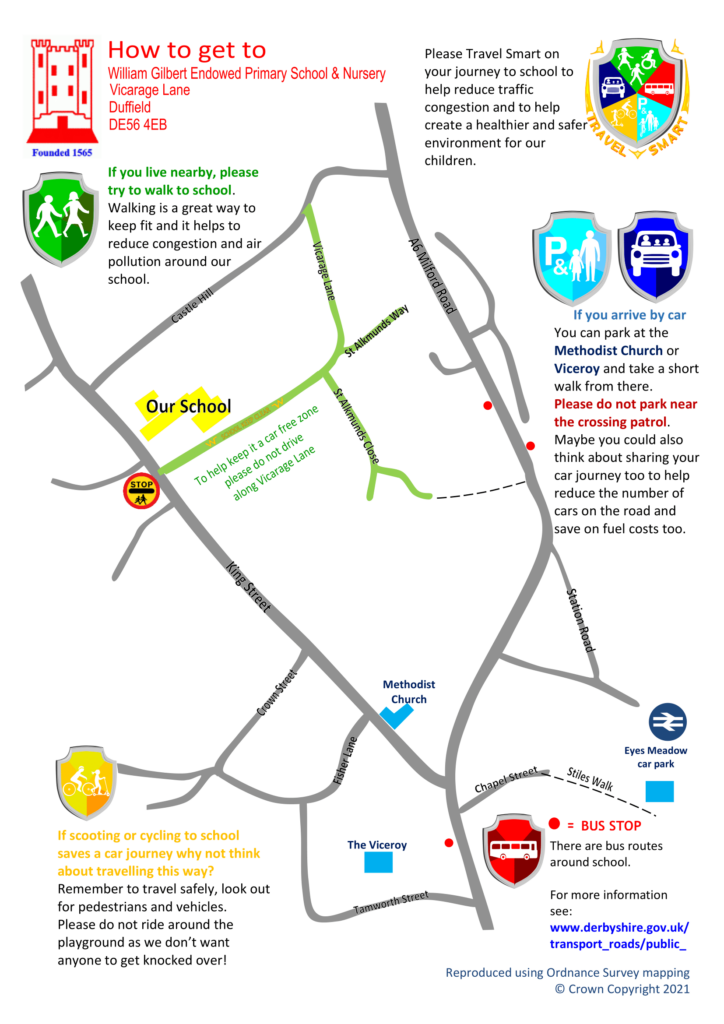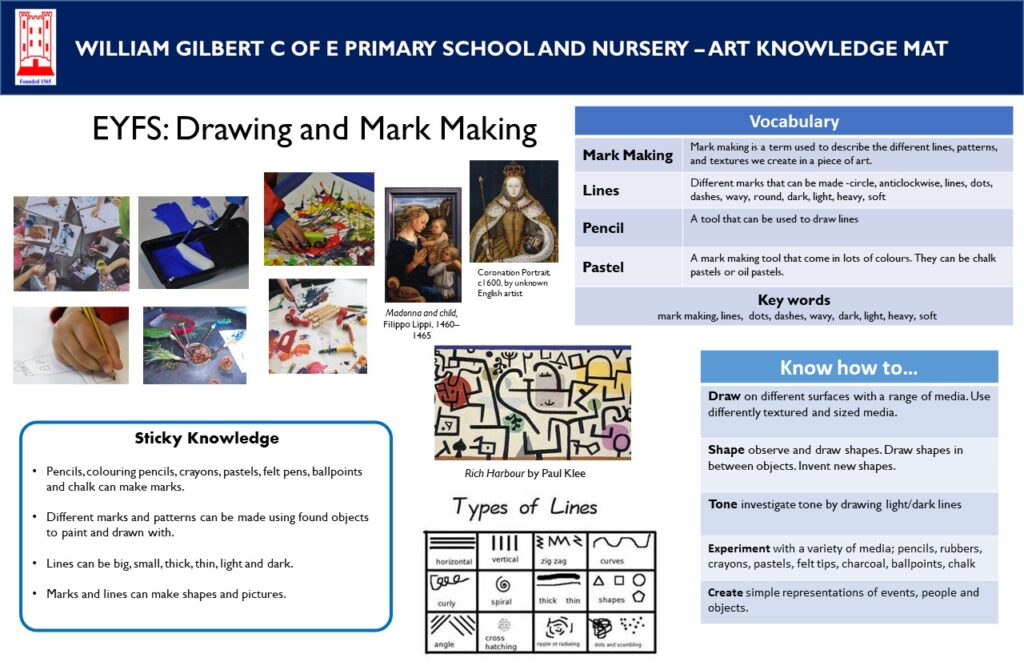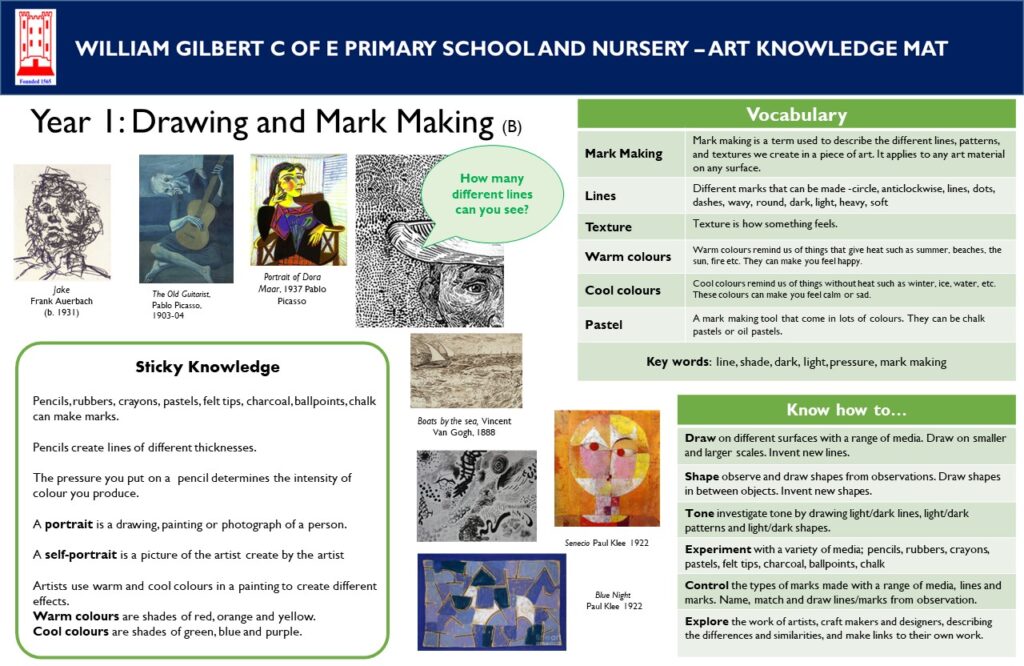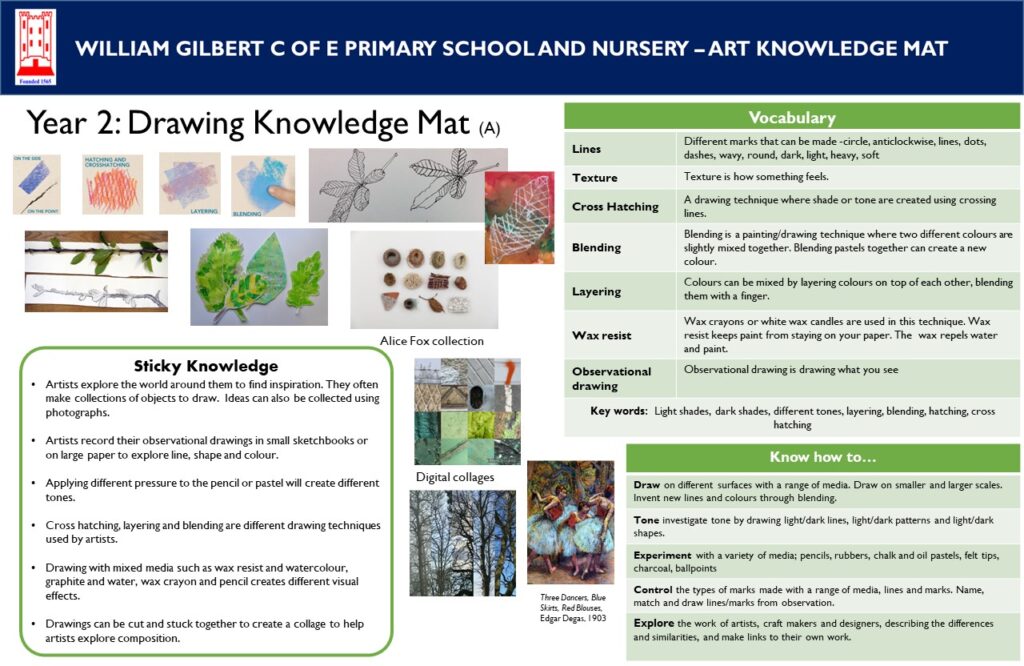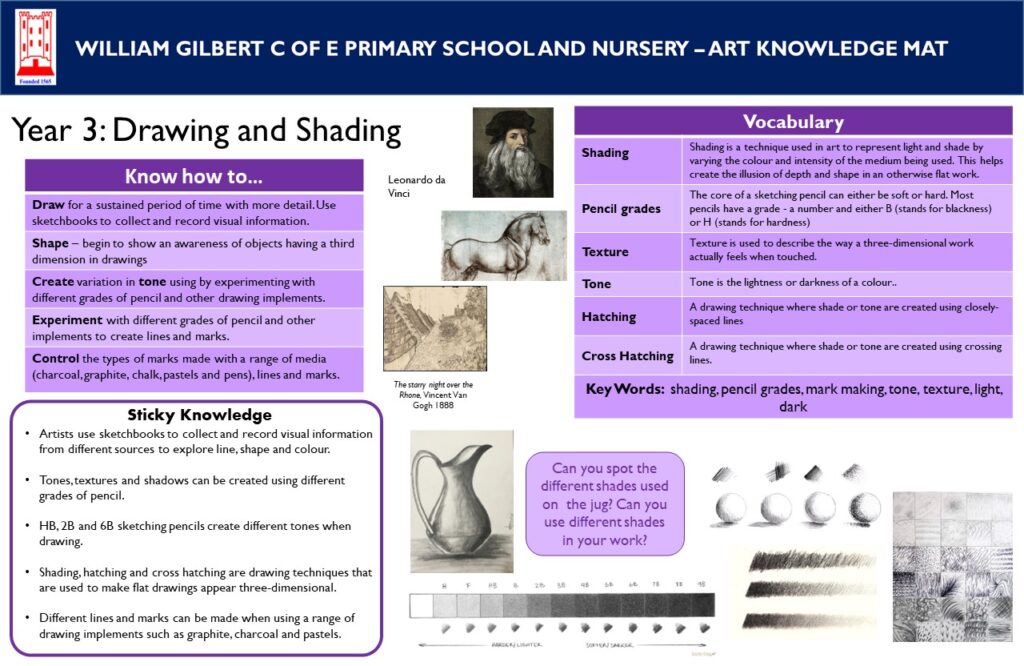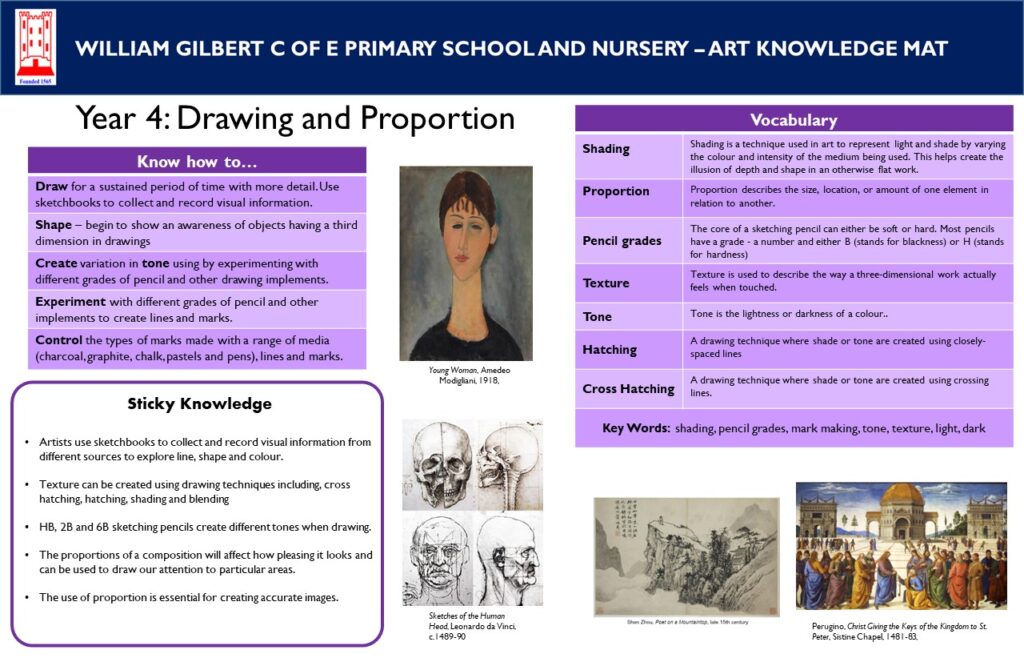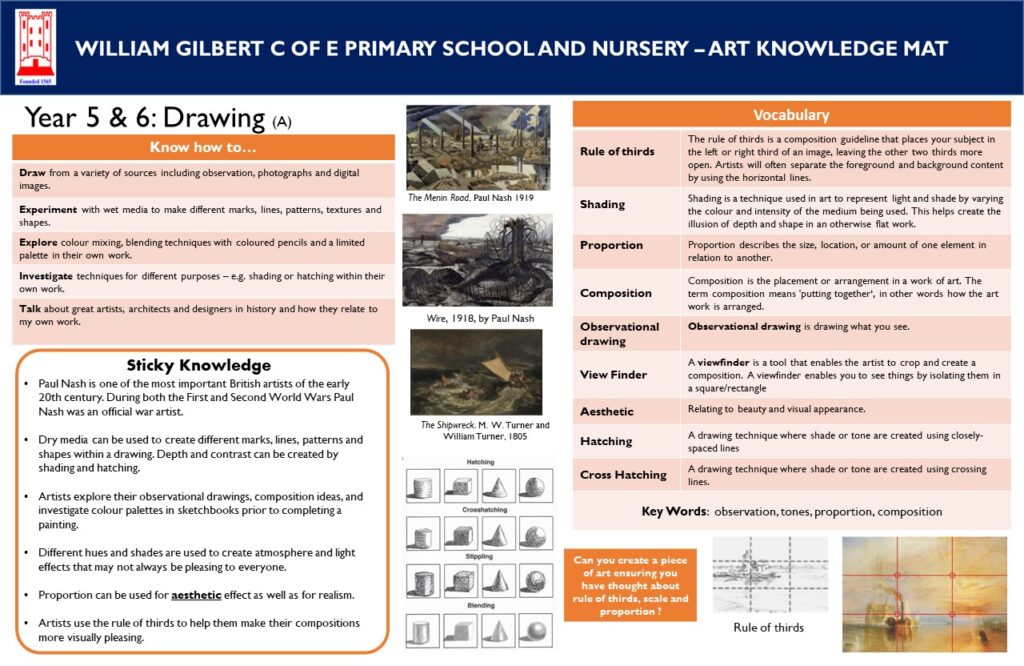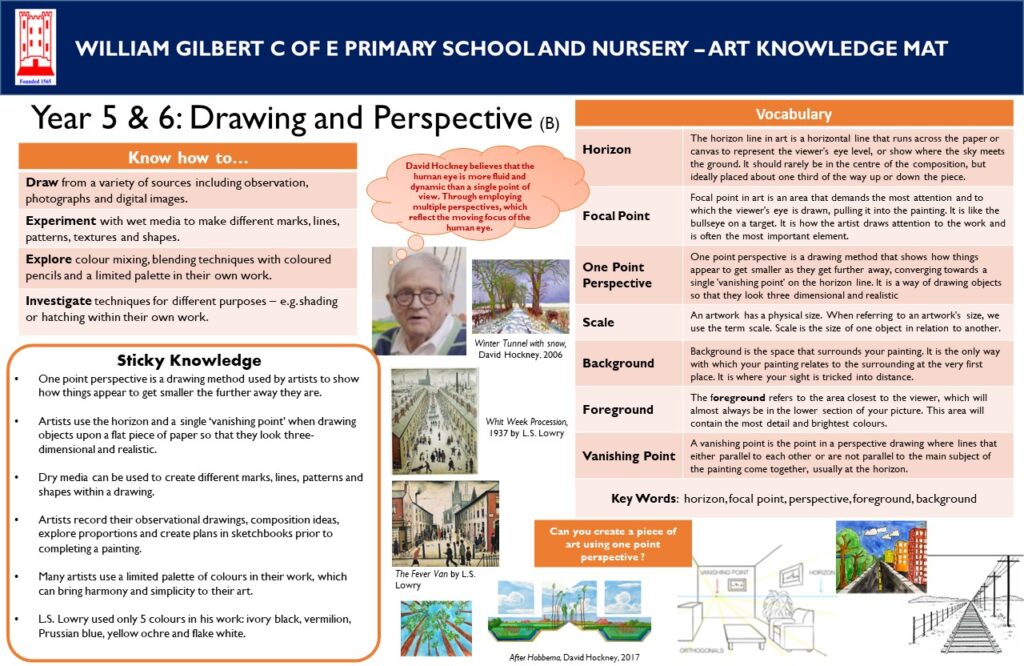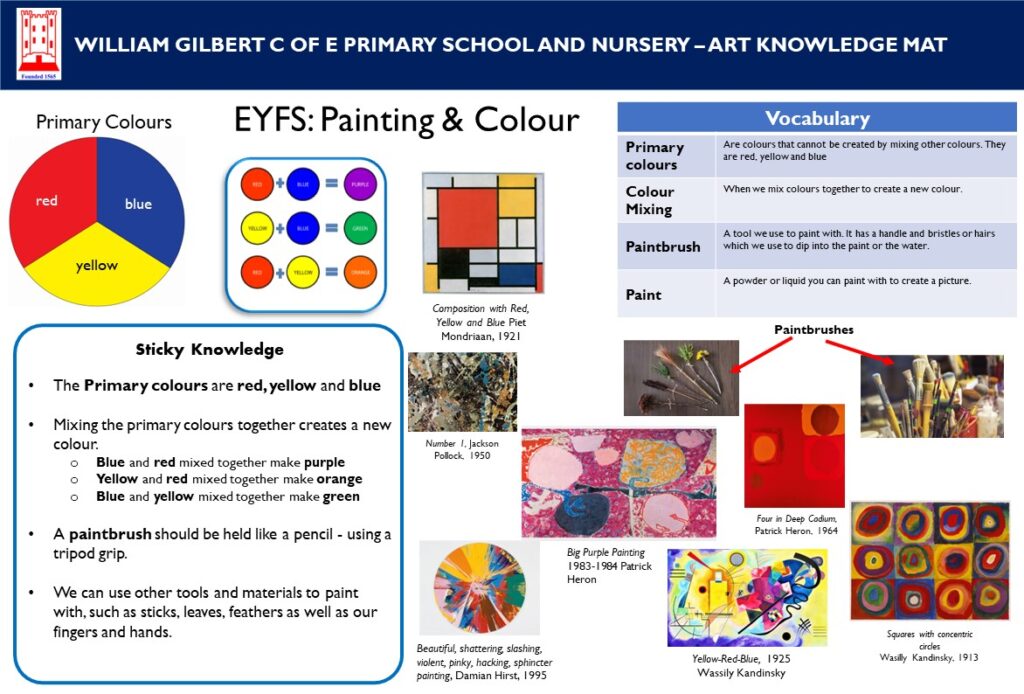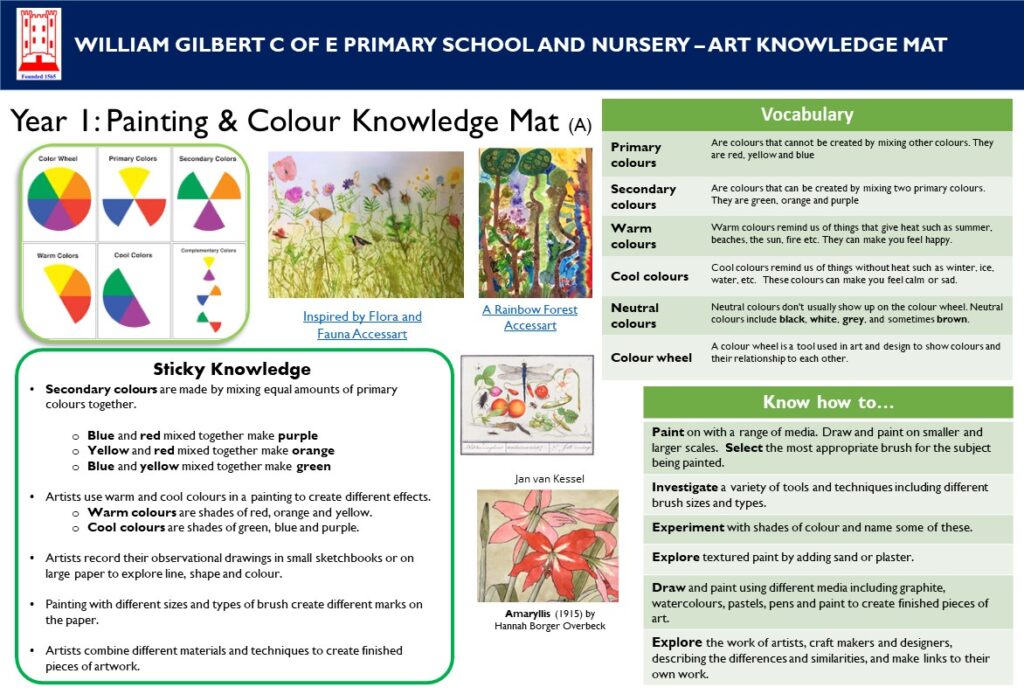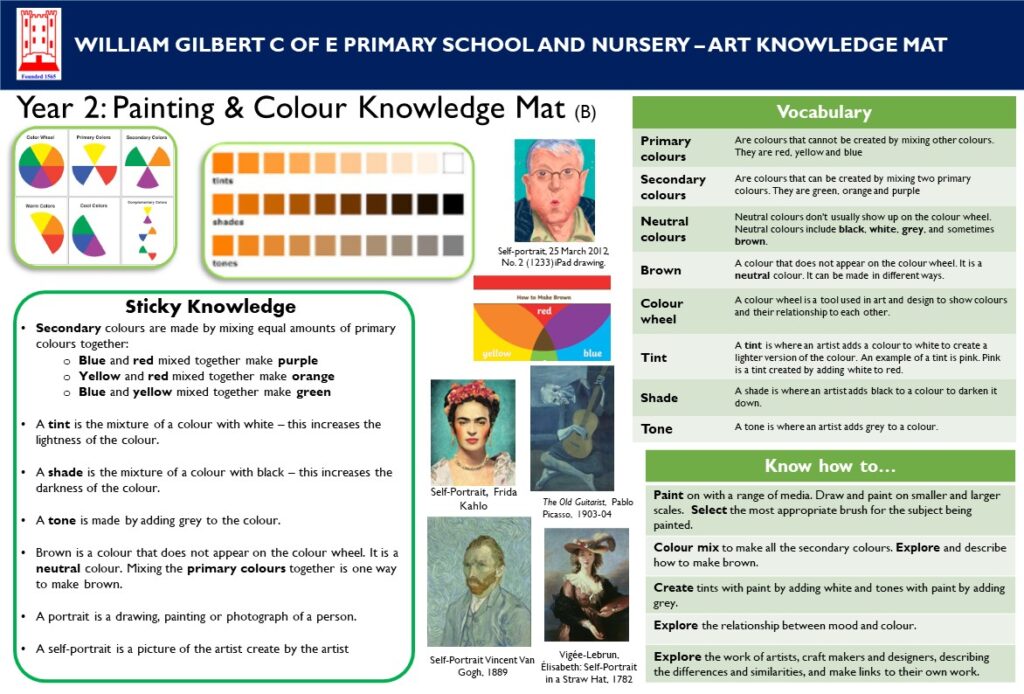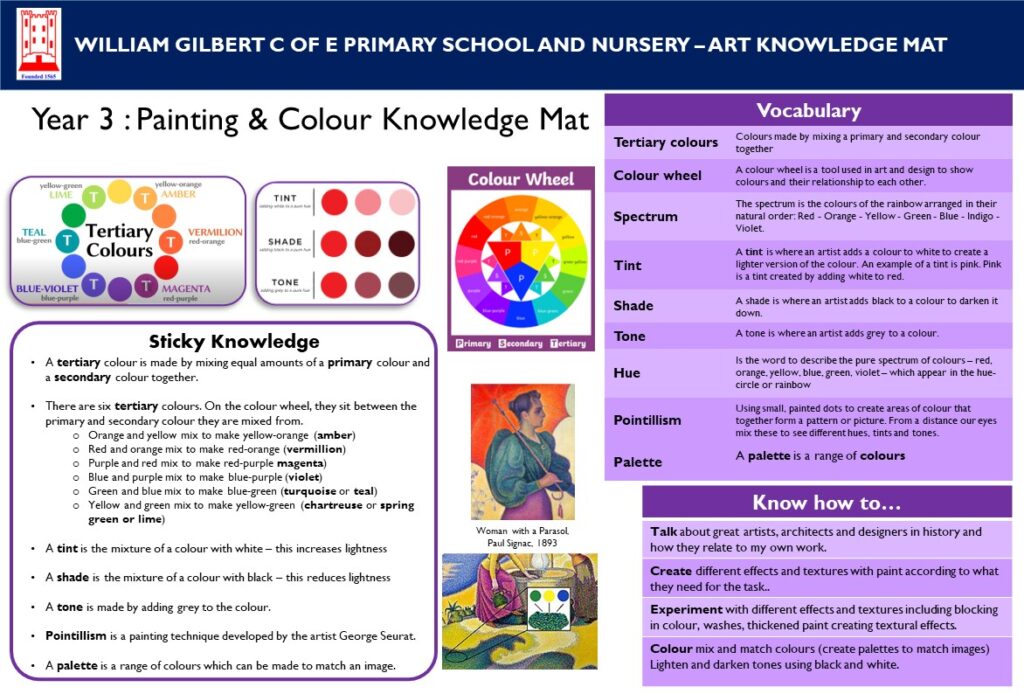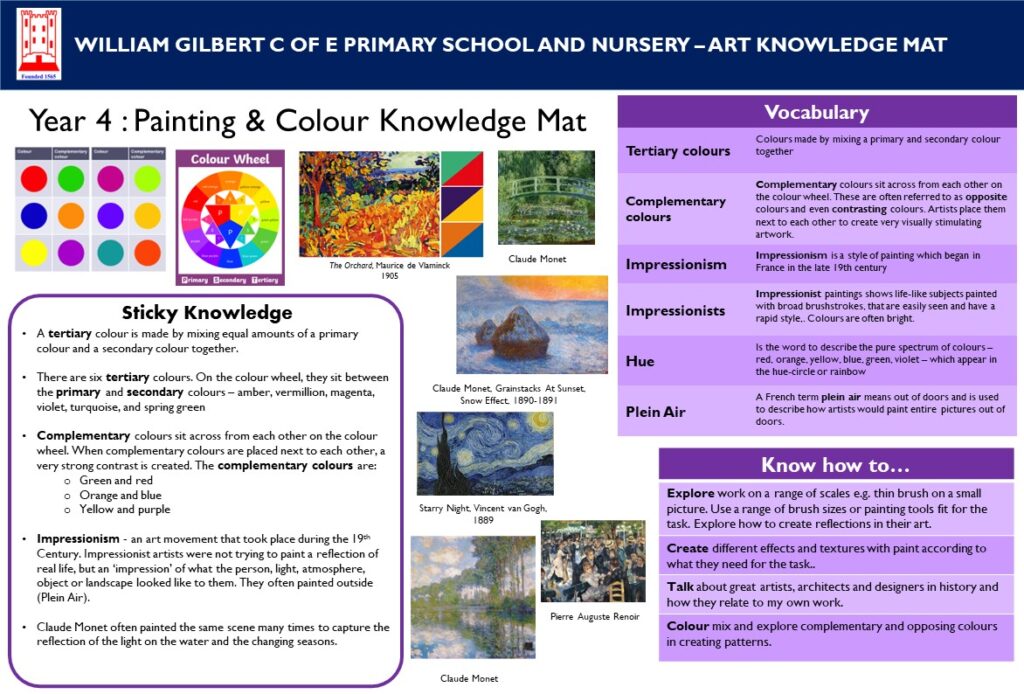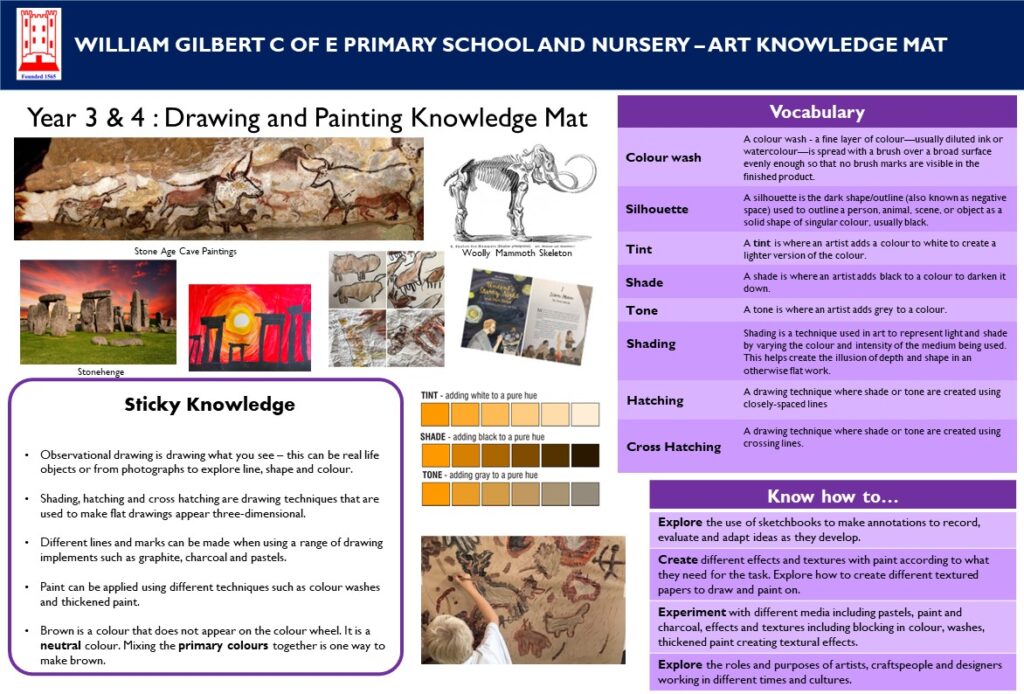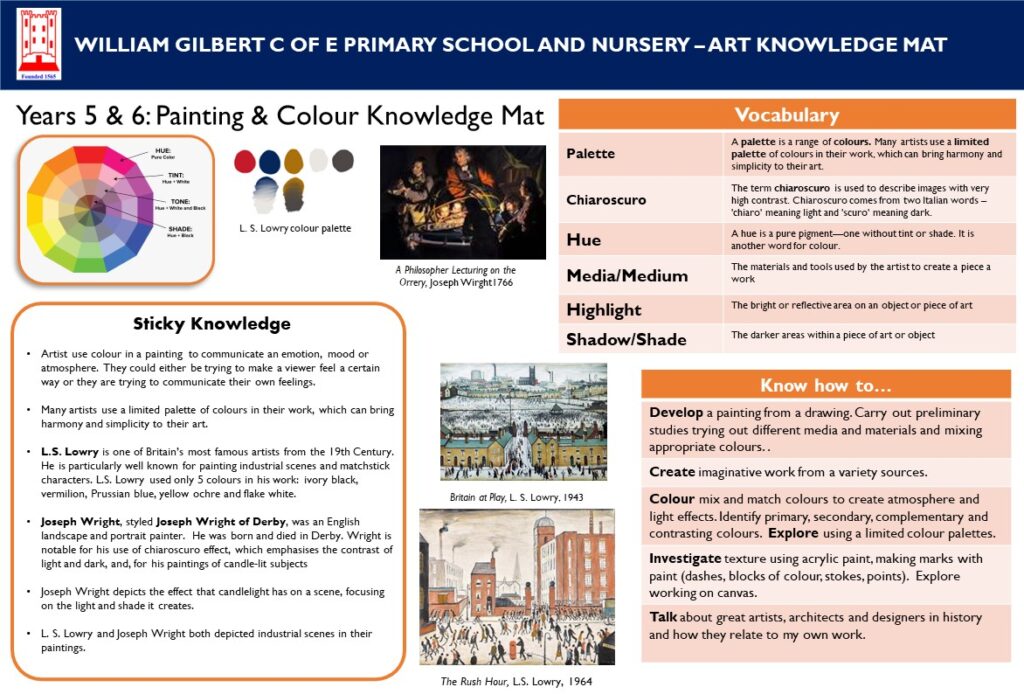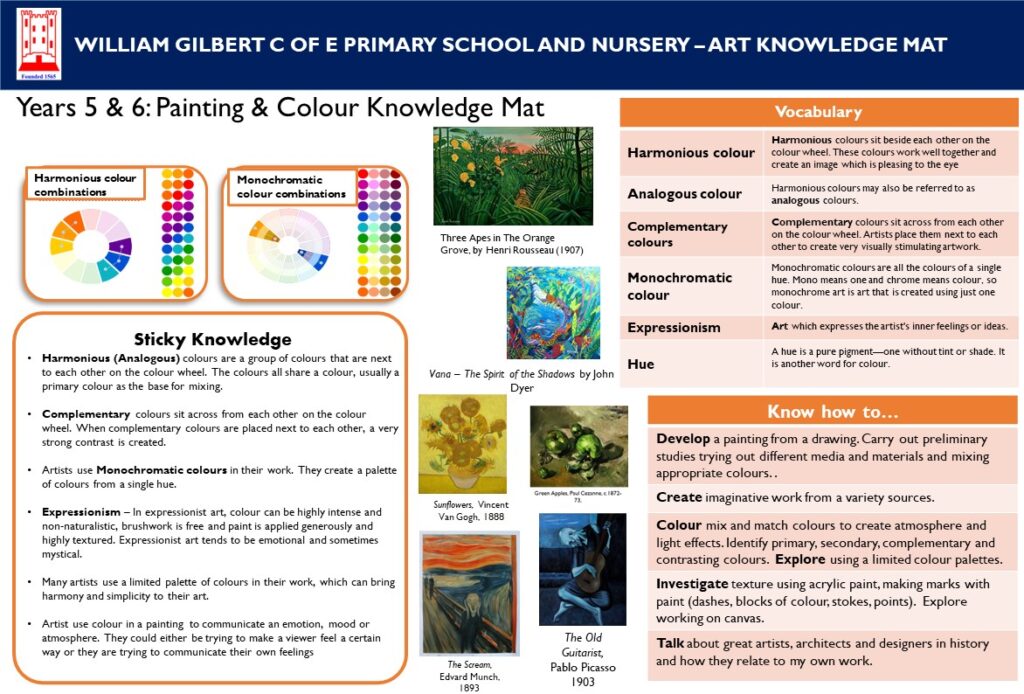Knowledge Mats
Year 1
How and why do we celebrate special and sacred places?
What makes some places sacred?
How can we care for others and the world?
What do Christians believe God is like?
What is the good news Jesus brings?
Who is a Jewish and what do they believe?
Year 2
What can we learn from sacred books?
What is Christmas and what does it matter to Christians?
Who is a Muslim and what do they believe?
Why does Easter matter to Christians?
At William Gilbert Endowed C of E Primary School and Nursery, we strive to make our travel to and from school as smart and active as possible. On this page there is a lot of information about the initiatives we have carried out to raise awareness.

Modeshift STARS is the national schools awards scheme that has been established to recognise schools that have demonstrated excellence in supporting cycling, walking and other forms of sustainable travel.
The scheme encourages schools across the country to join in a major effort to increase levels of sustainable and active travel in order to improve the health and well-being of children.
Every school in England can participate in Modeshift STARS for free and on completion of an application will automatically have a national standard School Travel Plan.
We are taking part in the national Modeshift Sustainable Travel Accreditation & Recognition for Schools award initiative which aims to:
- increase opportunities for daily physical activity by promoting active and healthier ways of travelling to school such as walking, cycling and scooting;
- make a contribute to improving air quality;
- help reduce traffic congestion;
- promote safer and sustainable ways of travelling for all journey modes.
Our Accreditations



Our school’s travel plan
Year 5 and 6
Painting and Colour
We have recently launched our new ‘Reach More Parents’ platform which brings engagement systems and apps into one, easy-to-use place.
- Targeting of all communications by class & year group.
- Safe, social-media style Newsfeed.
- In-app Messages.
- Push notifications.
- Scheduled reminders with Notices and Calendar.
- Shared news from social media accounts.
- Sync news with our Weduc Website in just a few clicks.
- Parents Evening Booking system
Our Approach to Teaching Learners with SEND
At William Gilbert we ensure that all pupils in our school are equally valued by having equal access to a broad and balanced curriculum which is differentiated to meet individual needs and abilities. We reflect what is outlined with the New Code of Practise ‘All children are entitled to an education that enables them to achieve the best possible educational and other outcomes, and become confident young children with a growing ability to communicate their own views and ready to make the transition into compulsory education’. (5.1:2015)
- We have effective management systems and procedures in place for SEND, taking into account the current Code of Practice (2015)
- We have successful communication between teachers, children with SEND, parents of SEND children, Teaching Assistants who run intervention groups and outside agencies.
- We acknowledge and draw on parents’ knowledge and expertise in relation to their own child
- Through the Person Centred Review meetings the children are encouraged to take an increasingly active role in their targets, progress and next steps.
- We are committed to developing the knowledge and skills of all the staff to ensure a personalised curriculum to meet the needs of all pupils through inclusive practice.
- We have an effective review cycle throughout intervention groups that allows us to monitor, review and plan for the next steps of development based on the ASSESS PLAN DO REVIEW cycle.
- We ensure that consideration for SEND crosses all curriculum areas and all aspects of teaching and learning.
What are the different types of support available for children with SEND in our school?
- Class teacher input via excellent targeted classroom teaching (Quality First Teaching)
For your child this would mean:
- That the teacher has the highest possible expectations for your child and all pupils in their class.
- That all teaching is built on what your child already knows, can do and can understand. (Provision Mapping)
- Different ways of teaching are in place so that your child is fully involved in learning in class. This may involve things like using more practical learning including visual aids to support class work.
- Specific strategies (which may be suggested by the SENCO) are in place to support your child to learn.
- Your child’s teacher will have carefully checked on your child’s progress (Pupil progress meetings) and will have decided that your child has a gap or gaps in their understanding/learning and needs some extra support to help them make the best possible progress.
· Specific group work / Intervention which may be:
- Led in the classroom or outside.
- Led by a teacher or a Teaching Assistant (TA).
- Intervention Programmes at William Gilbert include: Numicon, Rapid Reading, Fine Motor skills work, Nurture Group, Pirate club, Phonics Intervention, Physical Literacy, Toe by Toe, Word Wasp.
·
SEN Code of Practice 2015: SEND support
- This means they have been identified by the SENCO / class teacher as needing some extra specialist support in school from a professional outside the school.
This may be from:
- Local Authority central services such as the ASD Outreach Team or Sensory Service (for students with a hearing or visual need)
- Outside agencies such as the Education Psychology Service (EPS), Speech and Language Services (SALT)
What could happen:
- You may be asked to give your permission for the school to refer your child to a specialist professional e.g . a Speech and Language Therapist or Educational Psychologist. This will help the school and yourself understand your child’s particular needs better and be able to support them better in school.
- The specialist professional will work with your child to understand their needs and make recommendations as to the ways your child is given support. The school will then implement recommended programmes and strategies. The specialist professional may come back in to review progress.
The SEND support will take form of a four part cycle:
Assess
The graduated approach involves using the information teachers gather from on-going, day-to-day assessment to make judgements about the progress a child is making and to alert SENCO to any barriers that may be getting in the way of them making comparable progress to their peers. There will be a discussion on previous progress and achievement including any concerns expressed by parents. The assessment phase includes high quality teaching, support, interventions and a differentiated curriculum for the individual alongside observations, assessments and pupil progress meetings.
Plan
This part of the cycle involves discussing, planning and agreeing what will be put in place as an outcome of the assessment information gathered. The planning involves the child, parents and staff from the school who know the pupil well. Where other professionals are working with the child, they should also contribute to planning. The initial step of the planning process includes agreeing targets for the child in order to focus attention on key areas and give them a clear idea of what they need to do to improve their work.
The targets should aim to support the child to work towards their long-term outcomes. Following this, additional or personalised support should be identified, along with any specific teaching strategies, approaches or resources to be used. This might include:
- Specialist programmes or a personalised curriculum.
- Additional resources.
- Working in a small group – e.g. for an intervention.
- Peer support or extra support from an adult.
- Physical or personal care support.
A timescale for reviewing the plan, and details of how progress will be monitored, also needs to be identified.
- One-page profiles.
- Individual Education Plans (IEPs).
- Provision maps.
Do
The Code of Practice makes it clear that it is the responsibility of class and subject teachers to implement the plan on a day-to-day basis. In practice, implementing the support plan will mean:
- Delivering high-quality teaching to the student in every lesson.
- Implementing any adjustments, specific strategies or approaches to classroom teaching that have been identified in the ISP.
- Managing any teaching assistants who are supporting students with SEN in your lessons.
- Implementing any targeted interventions or specialist provision where this requires the involvement of the teacher.
- Continually assessing and monitoring the student’s progress and making any necessary adjustments to planning and teaching as a result.
- Communicating regularly with the student their parents, the SENCO and any other staff involved in order to establish how things are going and whether any changes are required.
Review
The SEN review will provide an opportunity to focus on the specifics of the support plan and to formally evaluate how successfully the support is meeting the needs of the student. The reviews are incorporated as part of parents’ meetings but dedicated meetings can also be planned. When the review meeting between the child, parents and any relevant professionals takes place, we consider:
- What progress has the student made? Have they achieved their agreed targets and what is the evidence for this?
- What impact has the support/intervention had on progress?
- What are the student’s, parents’ and professionals’ views on the support/intervention?
- What changes need to be made to targets or provision next term?
A record of the outcomes of the review discussions should be kept and used to update the provision map or IEP.
A continual process
The assess, plan, do, review process is a cycle – the idea being that this process is continual. If the review shows a student has made really good progress, this may mean they no longer require the additional provision made through SEN support. If this is the case, the student is likely to be taken off the SEN record and, instead, will be monitored to ensure progress is sustained through inclusive high-quality teaching.
What are the different types of support available in school?
At William Gilbert, we always plan to support learners through quality first teaching initially to ensure access to learning for all children in individual classes. Supportive strategies which may be used include – visual timetables, writing frames, differentiated resources, alternative recording (e.g.: Read, Write Gold) behaviour reward systems, Sensory breaks, practical apparatus and recordable devices (e.g. iPad).
Children who are identified as having SEND are entitled to support that is additional to or different from a normal differentiated curriculum. The type of support that they receive depends on their individual learning needs and is intended to enable access to learning and overcome the barrier to learning identified. We support children in collaboration with parents and young people who have choice and control over their provision. We also collaborate between education, health and social care services to implement the most specialist support.
Interventions
Each learner identified as having SEND is entitled to support that is ‘additional to or different from’ a normal differentiated curriculum. We offer a wide range of interventions across the school to children who are identified with SEND delivered by teachers and TA’s. These are closely monitored by the SENCo, subject leaders, class teachers and TAs and if necessary are adapted to meet the needs of the individual children who are taking part. Interventions currently on offer include:
- Precision teaching
- Daily readers
- Rapid Readers
- Read Write Inc Intervention
- Pirate Club (before school club focused on core English)
- Phonics groups
- Speech and Language support
- Maths groups
- Physical Literacy
- Nurture Group (supporting Social, Emotional and Mental Health)
- Lego Therapy
- Behaviour Box
- Attention Autism
- Funky Fingers Programme (Fine motor skills)
- Beat It Dyslexia
- Read Write Gold
- Toe by Toe
- Word Hornet
- Plus 1
- Power of 2
- It is paramount that interventions are planned to remove barriers, but equally are not intended to remove children from other areas of the curriculum. Therefore, we plan English and Maths interventions before school, after school and during lunch time.
- Monitoring progress is an integral part of teaching and learning at William Gilbert. Children with SEND are set targets either with an Individual Education Plan or through the provision map, alongside the rest of the children in school which are shared regularly with parents/carers. If we find that a child is not meeting their set targets through the quality first teaching, additional interventions and the involvement of external agencies we may take the decision to apply for additional funding called GRIP (Graduated Response to Individual Pupils). This may end up in an Educational Healthcare Plan (EHCP) being written for a child. Parents/carers are kept regularly informed through this process.
Adaptions to the curriculum or learning environment may be made to remove barriers to learning and to enable children to participate in the curriculum. Here are some examples:
- Sitting at the front of the classroom
- Writing slope
- Use of symbols, signs and visual timetables
- Using adapted, enlarged resources
- Use of technology including laptops, iPad, voice recorders
- Work stations
- Use of TEACCH intervention to support children with ASD
- Use of colour overlay
- Reduces school days
- Use of PECS, Makaton, Sign Language
- Sensory breaks / Sensory diets implemented
What support is there for my child’s overall wellbeing?
At William Gilbert School, we believe that pupils achieve best when they are happy. We celebrate the children’s successes with positive learning experiences. Sometimes children also experience some setbacks or challenges along the way and we are committed to supporting them through these through our whole school nurturing approach. These needs can present themselves in a number of ways including behavioural difficulties, anxiousness, being upset or uncommunicative.
- Any member of staff or the child’s family can refer concerns about a child’s wellbeing to the SENCo, head teacher or class teacher. Decisions are then made about the appropriate response. Safeguarding, SEND and Equality policies are followed and applied.
- If further support is required Mrs Davies (SENCO) can seek further advice and support. This may involve working alongside outside agencies such as Health and Social Services, and/or the Behaviour Support Service.
- For some children who struggle with the transition between home and school we can arrange a ‘Meet and Greet’ in the main entrance. Furthermore we have a Teaching Assistant who has a focussed well-being role, providing opportunity to talk about their thoughts ad take part in activities to support them.
- At lunchtimes play leaders run activities to support the children with social skills and this also ensures that everyone has someone to play with.
- We also run a Nurture Group which has personalised objectives and activities to meet your child’s needs.
- Where there is a social and emotional need school staff work closely with families and the child to identify the issue and use appropriate means to support the child. School promotes strong relationships and communication with parents which enable us to work in partnership.
- Enrichment opportunities are planned to engage pupils such as cooking, sewing, 5 a side, basketball, bridge, yoga, chess, computer club.
- Other agencies are involved as appropriate and the school nurse comes and visits to provide emotional support, healthy eating, vaccinations, weight management, hearing tests and teeth cleaning. Other health professionals and / or specialist educational services are assessed as required.
Who could support your child SEND in this school?
School Provision (directly funded by the school)
- Teachers are responsible for planning differentiated sessions to meet the needs of all pupils within the class setting
- Teaching Assistants working with small groups or individual children under the direction of the teachers. This is funded from the SEND budget
- Small groups for reading interventions, writing support, fine motor skills work and Numeracy programmes
- Teaching Assistants offering support for children with Phonics Intervention, Nurture groups, Physical Literacy
- Educational Psychology Service
- Education Welfare Officer
·
Multi Agency Provision including Local Authority Provision delivered in school
- Support Service for children with Special Educational Needs (SSSEN)
- Educational Psychology Service
- SALT (Speech and Language Therapy)
- Autism Outreach Service
- Behaviour Support Service
- Specialist Teachers for the hearing, visually and physically impaired
- Parent Partnership
- Social Care
- School Health
- Occupational Therapy
- Physiotherapy
- Child and Adolescent Mental Health Service (CAMHS)
- Clinical Psychology
- Continence Nurse
- Input from Paediatricians
- Lighthouse
- Community Learning Disabilities Team
- SENDIASS
- Multi-agency team (MAT)
Voluntary Sector
- Umbrella
- SENDIASS
- Action for Children
- QWELL
More information can be found on: http://www.derbyshiresendlocaloffer.org/
SDAT is an intuitive led by Derbyshire Police in conjunction with Social Care, Heath Services and other agencies, who work together to safeguard children and adults.
Stopping Domestic Abuse Together (SDAT)

SDAT is an intuitive led by Derbyshire Police in conjunction with Social Care, Heath Services and other agencies, who work together to safeguard children and adults.
Domestic Abuse can encompass but is not limited to the following types of abuse:
Psychological
Physical
Sexual
Financial
Emotional
What is SDAT?
SDAT is an early notification system to schools to quickly notify them of any incidents of domestic abuse where the Police have attended a household where children live. This enables schools to understand changes in a child’s behaviour, attitude or general presentation and to support children if needed.
Children and young people witnessing domestic abuse
Witnessing domestic abuse is really distressing and scary and it causes serious harm to children.
Children who witness domestic abuse can experience a wide range effects. They may:
- Become anxious and depressed
- Have difficulty sleeping or have nightmares
- Be easily startled, flinch or react disproportionately to loud noises
- Complain of physical symptoms such as tummy ache
- Start wetting the bed
- Have temper tantrums and display challenging behaviour at school
- Behave younger than they are
- Not want to go to school
- Become aggressive towards others
- Have poor self-worth
- Self-harm
- Have difficulty forming positive relationships
They may feel:
Guilty – because they think they have done something wrong
Powerless – because they can’t stop the violence
Confused – because it doesn’t make sense
Angry – because it shouldn’t be happening
Sad – because it’s a loss
Afraid – because they may be hurt, they may lose someone they love, others may find out
Alone – because they think it is only happening to them
The Hideout
The Hideout is an organisation that offers support and advice to children and families affected by Domestic Abuse.
To find out more visit The Hideout website
Refuge
Refuge is the country’s largest provider of specialist domestic violence services.
The Derby City Domestic Violence Service provides free confidential, non-judgemental and independent support and advice for those living in Derby City who are experiencing domestic violence. The service is available for both men and women.
The service will work with people who have experienced domestic violence to create a tailor made safety and support plan which will include:
- Personal safety information
- Support to contact the police
- Information on the criminal and civil justice options available and support if they are going through a court case
- Support to secure an injunction
- Help to improve the safety of child contact
- Information about safe housing options
- Referrals to other services
- The opportunity to discuss the effects of domestic violence with someone who understands
The team will accept referrals from:
- Individuals who want to self – referral into the service
- Professional who refer to the service must have consent from the person they are referring
- Family, friends and other third parties may call for support
The service is available to anyone living in Derby City who has experienced domestic violence and who is assessed to be at standard to medium risk of domestic violence, stalking and ‘honour’ based violence.
To make a referral to the service:
- Telephone: 0800 0853481
- Email: DCDVS@Refuge.org.uk
Further information about Refuge can be found here.
The Freedom Programme
The Freedom Programme is a 12 week support group for women. The programme is open to any woman who wishes to learn more about the reality of domestic abuse.
The Freedom Programmes aims to:
- help women to understand the beliefs held by abusive partners and in doing so, recognise which of these beliefs they have shared
- help women gain self-esteem and the confidence to improve the quality of their lives
- show the effects of domestic abuse on children
- help women to recognise potential future abusers
- introduce women to support services across Derby
The Freedom Programme is now being run from venues across Derby. All courses are open to women from any area.
All programmes are free.
Further information about the Freedom Programme can be found here.

